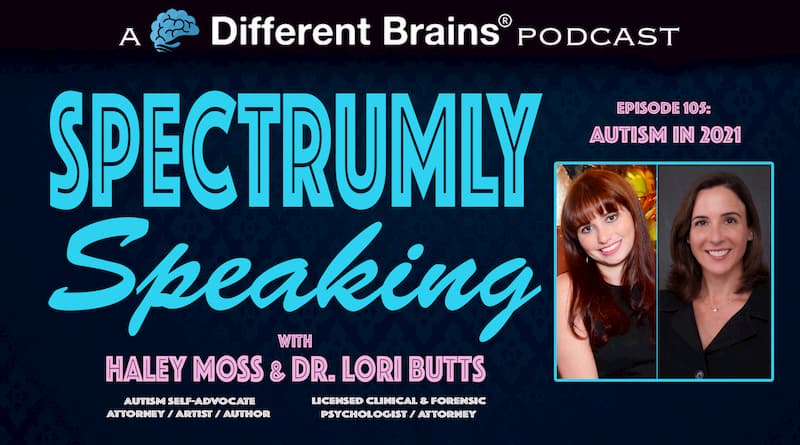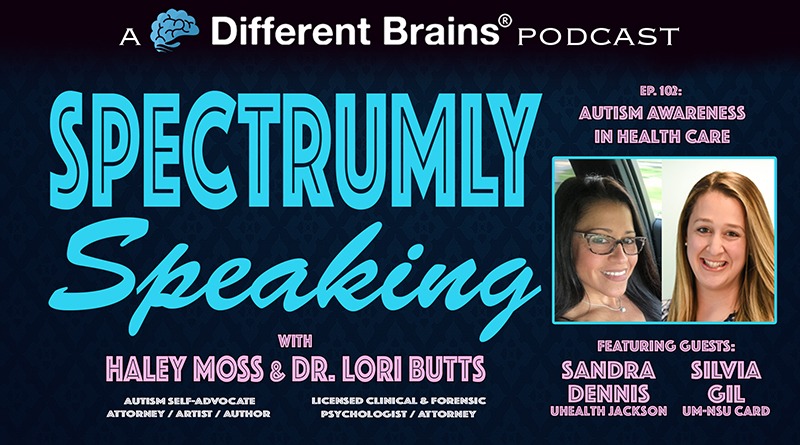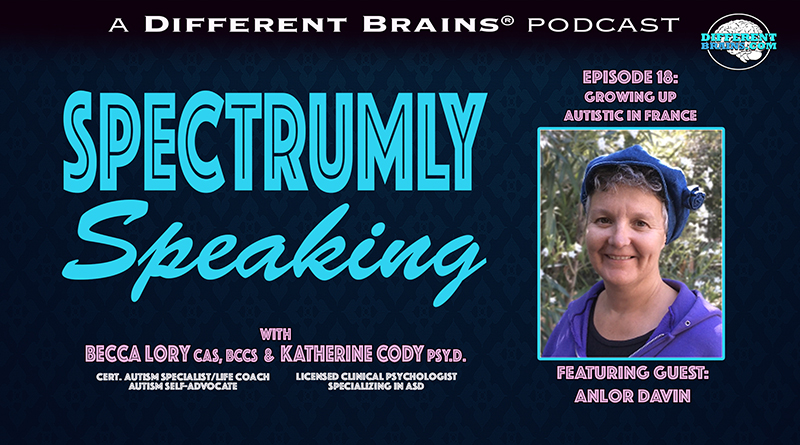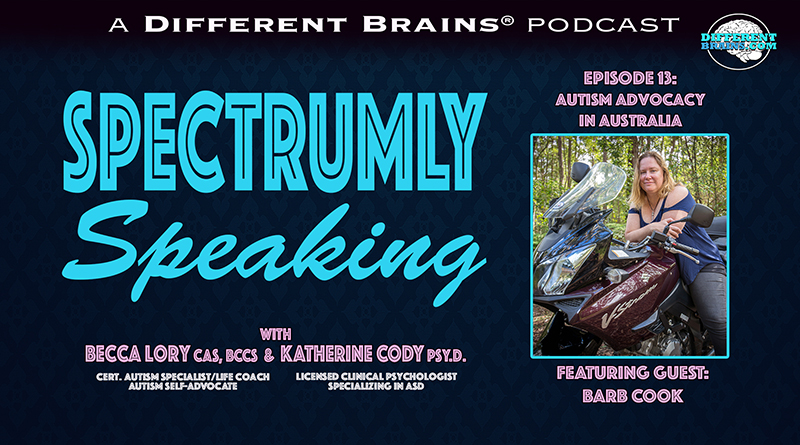
Autism in 2021 | Spectrumly Speaking ep. 105
Spectrumly Speaking is also available on: Apple Podcasts | Stitcher | SoundCloud
IN THIS WEEK’S EPISODE:
(AUDIO – 19 mins) In this New Years mini-episode, hosts Haley Moss and Dr. Lori Butts discuss what they think the best moments for the autism community were for 2020, and what they hope 2021 has in store. Do you have goals set for the new year? We would love to hear! Happy New Years from Spectrumly Speaking and Different Brains!
Spectrumly Speaking is the podcast dedicated to women on the autism spectrum, produced by Different Brains®. Every other week, join our hosts Haley Moss (an autism self-advocate, attorney, artist, and author) and Dr. Lori Butts (a licensed clinical and forensic psychologist, and licensed attorney) as they discuss topics and news stories, share personal stories, and interview some of the most fascinating voices from the autism community.
For more about Haley, check out her website: haleymoss.net And look for her on Twitter: twitter.com/haleymossart For more about Dr. Butts, check out her website: cfiexperts.com
Have a question or story for us? E-mail us at SpectrumlySpeaking@gmail.com
CLICK HERE FOR PREVIOUS EPISODES
EPISODE TRANSCRIPTION:
HALEY MOSS (HM):
Hello, and welcome to Spectrumly Speaking. I’m Haley moss, an attorney, author, artist, and I’m autistic. Today I’m joined here by…
DR LORI BUTTS (LB):
Hi, I’m Dr. Laurie Butts. I’m a psychologist and an attorney.
HM:
This is our last episode of the year. So as is tradition here at spectrally speaking, we’re planning on discussing what we consider the best moments for the autism community and 2020. What we’ve accomplished on the show so far this year, and what we’re hoping that 2021 may have in store. So I think we’ve been through a lot together this past year. So instead of just defaulting to “how are you”, because that’s what we usually do when we start off the show, I feel like: “how do we think this year has gone?”
LB:
All things considered, I think it’s gone really well. How about that?
HM:
I think so too. I think the most important thing, and I think a lot of our listeners can agree is that most of us, hopefully, if you’re listening, I hope that you and your family and the people you care about are safe and healthy, above all, and I feel very blessed, that I am able to be with family at this time that I am safe and healthy. And that, again, I think that’s what’s most important right now. So and I see things about people that are going hungry, or maybe unemployed right now. And there’s all sorts of stuff going on in the world. And I just feel grateful right now. So I think for as much of a dumpster fire as 2020 has been that when we take stock of what we do have a it’s really pretty good.
LB:
Right. I mean, at the end of the day, it’s a good lesson as to what priorities need to be throughout life, and family and health. And everything else is non essential. I mean, you know, that’s, you know, as long as you have that, you’ve got the building blocks for an amazing life. And, and so it’s it’s reminding ourselves, once we get through all of this, that the basics of, of our well being are, are really all that matters. Everything else is just noise and extraneous.
HM:
And I think that kind of goes back to what we talked about in our Thanksgiving episode about having gratitude and being writer about expressing gratitude, not just at that time of the year, right?
LB:
Yep. Yep, you’re absolutely right.
HM:
So I do think that this year has been kind of rough on the autism community and the autistic community in particular. So obviously, we’ve had a lot of routine changes with down and wearing masks and new sensory issues, new routines, and new social isolation, as socializing is already hard enough. And I also think when we think about all this stuff that’s happened in the community, it also happened alongside a lot of very important moments in here in the US and around the world, too. So we’ve had more increased calls for racial justice, we had an election that we talked about voting in, right, had all sorts of big stuff happen. And I think that when we talk about what the best things in this community, we’re so on top of the fact that people with developmental disabilities seem to be more at risk with COVID, and things like that. That all sounds pretty terrible when we think about it. But I think the best thing is that we’ve been able to somehow come together, we’re still increasing our activism even while we can’t always take it to the streets, for instance, or be able to make those in person changes that we usually want to I do think that activism has been at an all time high, I think that the community is beginning to do better, especially about listening to multiple marginalized autistic experiences. I think that’s something that we’ve made more of a point of doing here at spectrally speaking. And I remember saying this in our year end wrap up last year is we wanted to have more people of color more non binary folks more queer autistics, more or more parents, more people with diverse experiences from all over the world as well. And I think we’ve done a lot better about that. So I think seeing that diversity of our community, more at the forefront has been a very good thing. And it’s something that I think here at spectrum Lee speaking that we could be particularly proud of.
LB:
I have to agree with you completely about that. I think we’ve made it an effort to do so. And there’s always room for, you know, improvement, but I think that that we’ve really tried hard to expand our reach and expand you know, the people that we talk to and get more different diverse perspectives. And I’ve certainly learned a lot this year through through the different voices that we’ve heard.
HM:
I have too. I feel like kind of knowing when to listen has always been something that I particularly value whenever we have people who have different experiences that we do. And also, especially when people are coming from multiple marginalized perspectives because they’re things that I am never going to understand because it’s not a lived experience I’ll ever have. I think that we’ve been getting better and learning more about listening to one another. And it’s really grateful, being able to, like, I feel really grateful that we’re able to pass the mic a lot. And it’s something that I want to continue doing. And I want to keep pushing that boundary, wherever we can. And something I think that would also be great. I’d love to see more younger people, at least as we’re talking about next year.
LB:
Yes, great. Yes.
HM:
yes. And I’d love to see some more like autistic elders. So I don’t know if I’ll ever get lucky enough to see this on the show. And I really, really hope I do, I’d love to see like autistic grandparents.
LB:
Interesting.
HM:
I know, that’s kind of like a random thought. But we think about like, new parents, because we’re talking about parenting before we started recording today. I love like we talked about like new parents and like parents who get diagnosed later, but like, imagine being a grandparent, or an agent, like just even as talking to say, like, a teenager or someone who’s maybe 10 or 11. And saying this is what it’s like being autistic in elementary, middle school today, in 2020, and 2021. Because the experiences that I had as a young person at that age, say over 10 years ago is very different than today. I mean, I got in trouble for signing up for Facebook when I was in eighth grade. And at this point, Facebook is pretty ubiquitous. That’s fun. That was a time when like having your picture on the internet was a huge privacy concern. And I was like, Well, if you Google my name, you will get a lot of pictures of me that’s like totally normal.
LB:
Totally normal to you. But I still have concerns about it.
HM:
you know what I mean, though, like, pictures of you that are probably on this probably still like a picture of you on CFIexperts.com. Privacy concern? Oh, no. Well, like any picture of you that existed at that time was like, Oh, no,
LB:
Right.
HM:
I understood exactly like where parents and stuff were coming from, because some of the concerns about privacy that my parents had, and my family and my friends, etc. had at that time are still concerns we have now, but it definitely wasn’t as controversial. It’s definitely not as controversial. The photos of your friends at the beach.
LB:
Right, right.
HM:
So that’s why I think it would be great to have more age diversity when I’m thinking about it. And something else that I really like to highlight, and especially that we did accomplish here at in 2020. And that I’d love to see more of in 2021 is more of an international view of autism as well. So I don’t usually like to shout out particular guests that we’ve had, even because I love them all so much. But I really felt like we learned a lot when we had Abby Brooke on here. Oh, yes. We learned a lot about how Autism is viewed in Kenya, I believe it was yes. And I think that we have to take out this very westernized view of what autism is and isn’t because so many people would shame her, for instance, for even just saying Asperger’s or whatnot. Because, as we’ve noticed, terminology, and language evolves, but in other parts of the world, it might not evolve in that same exact way. So I think it’s really great when we have people with a more international perspective. And that’s something else I’d love to see more of in the future.
LB:
Yes, I think that’s a good goal that we should have. We’ll have to tape at different times for different time zones, but…
HM:
Probably. But I do realize a lot of our guests do have a tendency to be from the United States and Canada. Uh huh. I do know that I don’t think since we’ve been here. We’ve had too many folks from across the pond. So folks that are in Europe and the UK.
HM:
I know before we got here there were a couple of people from Australia. Okay. Okay. Yeah, I know, from before us. Mm hmm. But I think that’s something I’d really like to see more of as well as this more worldly view, I guess.
LB:
Oh, yes, absolutely. Absolutely. It’s always good to broaden the scope. Because immediately you can get very myopic and not not know what else is out there.
HM:
Exactly. And we realize how sometimes our own creations including the show can reflect our own biases. So I think that while a lot of conversations, especially in the autism community kind of do happen in an echo chamber, especially amongst autistic people, right, like, yeah, we need better rights. We need better this, how do we keep calling people in and how do we even get people who might have differing viewpoints in a way that’s respectful?
LB:
Right. That’s that’s the that’s…
HM:
I mean, we obviously don’t want to promote like quack science here. But we also know that there are people who may have different views on say, neurodiversity, or might think this is great, but also just the way that certain folks University might be a little too idealistic. So I think it’s really interesting when we get that diversity of perspective, diversity of experience, people from different parts of the world of all ages and stages in their journey through the autism and autistic communities. So There’s some stuff that I’m thinking about off the top of my head.
LB:
I like it.
HM:
I really like the idea of trying I’m really into like, I did a lot of research recently, I wrote a piece about artificial intelligence and bias. So I’m like, okay, even just learning how like, oh, that our human biases are basically embedded inside of machines. I was like, Okay, so how do we… we are, obviously are humans here. Our show is not written by robots, there is not a robot basically telling us what to say or anything like that. So how do we make sure that we have, that our biases aren’t completely reflected in the guests that we have? Or the conversations that we have, either.
LB:
That’s important. Yeah. That’s very important. And to be mindful of that I just took a course this week about, you know, biases and heuristics. And, you know, it’s, it’s something that our brains do, is shortcuts to make make processing easier. And so it’s just, you know, it doesn’t have to be a negative thing. You just have to be aware.
HM:
And acknowledge it.
LB:
Exactly. Exactly. And, and, and use protection, like to get other the way you protect from it is you get alternative hypotheses, you look at alternative, um, you know, perspectives. And that’s, that’s what I hear you saying, that’s really important. Yeah, absolutely.
HM:
You know, what else I think would be cool in that I’m thinking about it. But maybe like, a researcher?
LB:
Oh, yeah. That would be that’d be great.
HM:
Some really wonderful autistic researcher. I’m really cool work. And yeah, so cool. To have some more science…
LB:
Absolutely,
HM:
that we always stick in kind of the social issues. I think it’d be really cool to learn a little bit more science.
LB:
Yes. Science rules,
HM:
It does I’m just not, you know, super sciency.
LB:
I am I just, I just never even thought about that. In terms of this podcast, but you’re right. Yeah.
HM:
You never know. And especially because then we can highlight the wonderful women and non binary folks and people who are, like, diverse in terms of gender expression and identity that are doing the work and doing the research. And it’s just, I feel like research is such a male dominated field to begin with. It would be really cool to you know, get to uplift more of that, especially when it does benefit the communities that we are serving and who listen to us. I have so many feelings now that I’m thinking about, like, wow, how can we keep growing this and like, being super inclusive and super, like, interesting and diverse in terms of who we have as guests and discussions that we have going forward? Especially cuz 2021 will not be marked by an election. And hopefully, with the rollout of vaccination and people following health guidance that hopefully, we will get closer to the end of this pandemic, and then we could focus on more of the stuff that isn’t COVID-19 adjacent. Hopefully.
LB:
Right. That seems to be the plan. Hopefully, it’ll work out.
HM:
I hope so.I get excited.
LB:
Get excited, get out of the house.
HM:
That is it. That is a mood. So especially cuz right before, a couple weeks before Thanksgiving, I came home to my parents because like, my mom needed help with some things. I had some things to take care of back home. And I thought I’d be here for 10 days. And I’m still here, so…
LB:
Oh, well now you got now you got all of December. So I think you’re there.
HM:
Yeah, I think I’m gonna be here for a while.
LB:
Yeah, that’s good.
HM:
it’s good to be around everyone. But you know, things just kind of don’t go according to plan. And I think that’s something we’ve definitely, like I finally unpacked earlier this morning, because I was like…
LB:
You gave it…
HM:
I know, I was planning on being here for 10 days, but it’s currently been almost a month. And I don’t think that I’m going anywhere anytime soon. Like, I’m not just going to go spend all the holidays and right well, everything just alone at this point. And I don’t want to be alone somewhere like living alone without like a car and all this. It just doesn’t seem wise at this point. So here we are.
LB:
Good. Yeah, you know, the other thing is that I thought about 2020 there’s no segue, whatever, but you were talking about how, you know, I was saying we can all get out of the house and things like that. It’s it’s kind of like, um, you know, for people on the spectrum that tend to socialize and do social interactions through the internet. They are now you know, that’s not mainstream. Um, and so it’s, it’s interesting, I hope. You know, I know it’s difficult for people with autism to go out and socialize in person. And I hope that once the pandemics over that people, you know, go back to kind of pushing themselves out of their comfort zone.
HM:
Every event in the future has a zoom option forever.
LB:
Right
HM:
It won’t be weird. If it’s like, you know, like, if conferences go on in person, and there’s still a zoom link, like, I hope that just doesn’t like go away.
LB:
I don’t think it will. I don’t think it will. You know, one of my nephew’s is getting married, and we’re asking them to, you know, to do a zoom link for the wedding. And I don’t think it’s going away. I really don’t I just in terms of travel in terms of expense, you know, and in terms of accommodations, like, you know, all of those reasons, it’s, it’s, it’s a more inclusive, I’m a way to be where more people can be included. So I think it’s here to stay.
HM:
I hope so too.
LB:
So some positive things can happen from this pandemic.
HM:
I hope so. I hope that the world is becoming more accessible.
LB:
Right, right. Right. Right. And I think I mean, I think it is.
HM:
Oh, I’m hopeful.
LB:
Yeah. I don’t know how you really turn that back? Huh.
HM:
I think so too. And I think that means that we’re in for a pretty accessible and more inclusive future, because we know that it’s doable. And it’s not just some huge burden.
LB:
Right.
HM:
That was always kind of the case. Like, whenever people like remote work. We can’t do that. That’s such an undue hardship. Really, we just had the entire… I believe here in Miami Dade, we had the entire court system go remote in about like two or three weeks. And it’s still we’re doing jury trials and stuff remote still.
LB:
Not in criminal. But yeah…
HM:
Not criminal but largely, all civil stuff. I’m pretty sure. Sir, some of the civil the civil folks are like, oh, we’re still doing this, you know?
LB:
Right. We can figure it out. Right.
HM:
We totally got this.
LB:
Yeah, yeah. And as a society, that means more people will be heard more voices will be heard more people will be included. And it’s just, it’s great that that part is really, really great.
HM:
I think that going into the new year, we should have a lot of hope. I think things will continue to get better. And we have a lot to look forward to.
LB:
I agree.
HM:
So from our Spectrumly Speaking family and the Different Brains, family, to your family, and you We wish you the happiest and healthiest of New Year’s and we hope that 2021 has a lot better things in store than 2020 did overall.
LB:
Yes, we do.
HM:
So I think that wraps up our quick little discussion on the new year and what’s coming up. And what we’re hoping to do here at spectrum Lee speaking. If you want to help keep us accountable, or you have some great ideas, please let us know too. And be sure to check out different brains.org. And don’t forget to check out their Twitter and Instagram @DiffBrains and to look for them on Facebook. If you’re looking for me, you can find me on all major social media. So I’m at Twitter and Instagram @Haleymossart, and I’m on Facebook @Haleymoss. I have a blue checkmark next to my name on Facebook.
LB:
Oh, wow. Fancy.
HM:
I’ve had the blue checkmark for a while I still am aspiring to get one on Twitter and Instagram. But that’s a whole other can of worms and PR that I haven’t quite figured out.
LB:
You’ll have to explain it to me after the show.
HM:
And you can find me online at Haleymoss.net
great.
LB:
I can be found at CFIexperts.com Please be sure to subscribe and rate us on iTunes and don’t hesitate to send questions to spectrumlyspeaking@gmail.com. Let’s keep the conversation going.

Spectrumly Speaking is the podcast dedicated to women on the autism spectrum, produced by Different Brains®. Every other week, join our hosts Haley Moss (an autism self-advocate, attorney, artist, and author) and Dr. Lori Butts (a licensed clinical and forensic psychologist, and licensed attorney) as they discuss topics and news stories, share personal stories, and interview some of the most fascinating voices from the autism community.




